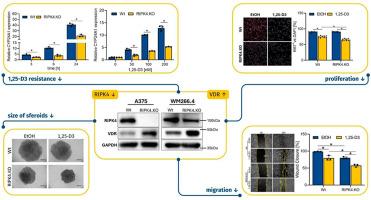RIPK4的抑制通过维生素D信号传导增强了对人类黑色素瘤生长的抑制。
IF 3.6
3区 医学
Q2 CELL BIOLOGY
引用次数: 0
摘要
受体相互作用蛋白激酶4 (RIPK4)下调抑制小鼠黑色素瘤和异种移植物生长中NF-κB和Wnt/β-catenin信号传导活性形式的维生素D3 (1,25-D3)除了通过维生素D受体(VDR)调节人体钙和磷酸盐代谢外,还可以抑制NF-κB信号通路,影响包括黑色素瘤在内的正常和恶性细胞的增殖和分化。过度活跃的NF-κB通路维持了黑色素瘤的恶性行为,这可能受到RIPK4和激活的VDR的影响。由于它们之间的相互作用影响黑色素瘤对1,25- d3的反应尚未被研究,我们测试了RIPK4的下调是否会影响黑色素瘤细胞对1,25- d3的敏感性。我们的研究结果表明,siRIPK4和CRISPR/ cas9介导的RIPK4敲除均可增加黑色素瘤细胞中VDR的表达。此外,在RIPK4下调的细胞中,CYP24A1表达降低,1,25 d3诱导的VDR水平升高。RIPK4的1,25- D3处理。与野生型相比,KO细胞在2D和3D培养(MTT或ATP测定)中显著降低增殖,并降低黑色素瘤细胞中的p-p65和cyclin D1水平。这些结果表明,敲除RIPK4可能会增强1,25- d3对黑色素瘤的治疗效果,这鼓励在临床前模型中进一步研究靶向RIPK4信号通路的抗黑色素瘤作用。本文章由计算机程序翻译,如有差异,请以英文原文为准。

Inhibition of the RIPK4 enhances suppression of human melanoma growth through vitamin D signaling
Downregulation of Receptor-Interacting Protein Kinase 4 (RIPK4) inhibits NF-κB and Wnt/β-catenin signaling in melanoma and xenograft growth in mice. The active form of vitamin D3 (1,25-D3), in addition to regulating calcium and phosphate metabolism in humans through the vitamin D receptor (VDR), can inhibit the NF-κB signaling pathway and can affect the proliferation and differentiation of normal and malignant cells, including melanoma. An hyperactive NF-κB pathway maintains the malignant behavior of melanoma, which can be influenced by both RIPK4 and activated VDR. As their interactions affecting the response to 1,25-D3 in melanoma have not been studied, we tested whether downregulation of RIPK4 affects the sensitivity of melanoma cells to 1,25-D3. Our results have shown that both siRIPK4 and CRISPR/Cas9-mediated RIPK4 knockout increase VDR expression in melanoma cells. Furthermore, a decrease in CYP24A1 expression and an increase in 1,25 D3-induced VDR levels were observed in cells with RIPK4 downregulation. Treatment with 1,25- D3 of RIPK4.KO cells, compared to their wild-type counterparts, significantly reduced proliferation in 2D and 3D culture (MTT or ATP assay) and decreased p-p65 and cyclin D1 levels in melanoma cells. These results indicate that RIPK4 knockout may enhance the therapeutic efficacy of 1,25-D3 against melanoma, which encourages further studies on targeting RIPK4 signaling for anti-melanoma effects in preclinical models.
求助全文
通过发布文献求助,成功后即可免费获取论文全文。
去求助
来源期刊

Molecular and Cellular Endocrinology
医学-内分泌学与代谢
CiteScore
9.00
自引率
2.40%
发文量
174
审稿时长
42 days
期刊介绍:
Molecular and Cellular Endocrinology was established in 1974 to meet the demand for integrated publication on all aspects related to the genetic and biochemical effects, synthesis and secretions of extracellular signals (hormones, neurotransmitters, etc.) and to the understanding of cellular regulatory mechanisms involved in hormonal control.
 求助内容:
求助内容: 应助结果提醒方式:
应助结果提醒方式:


